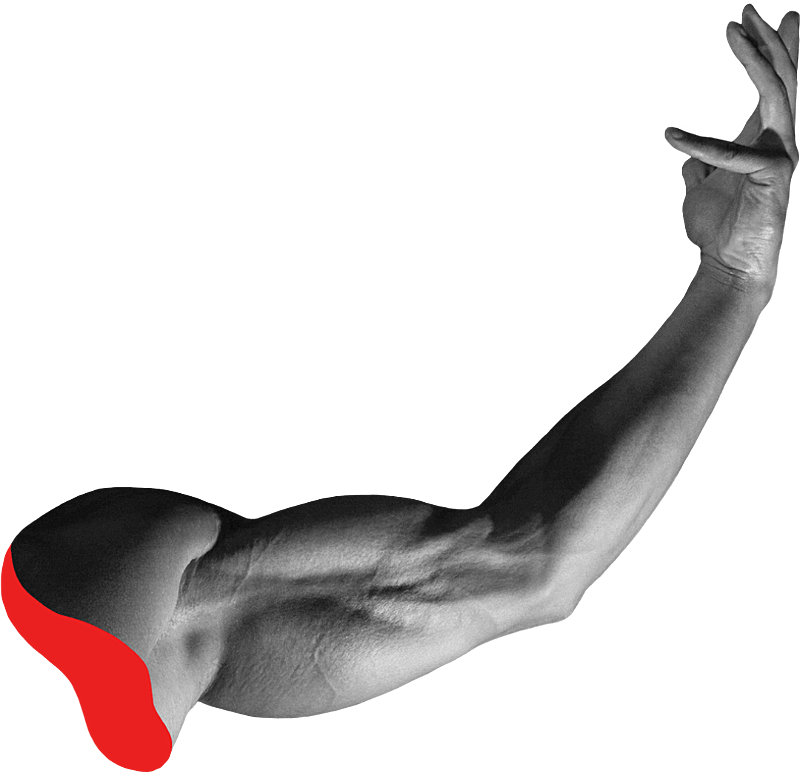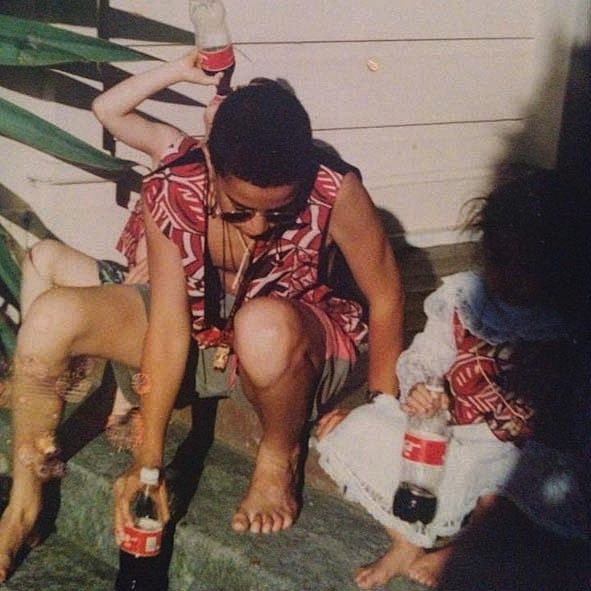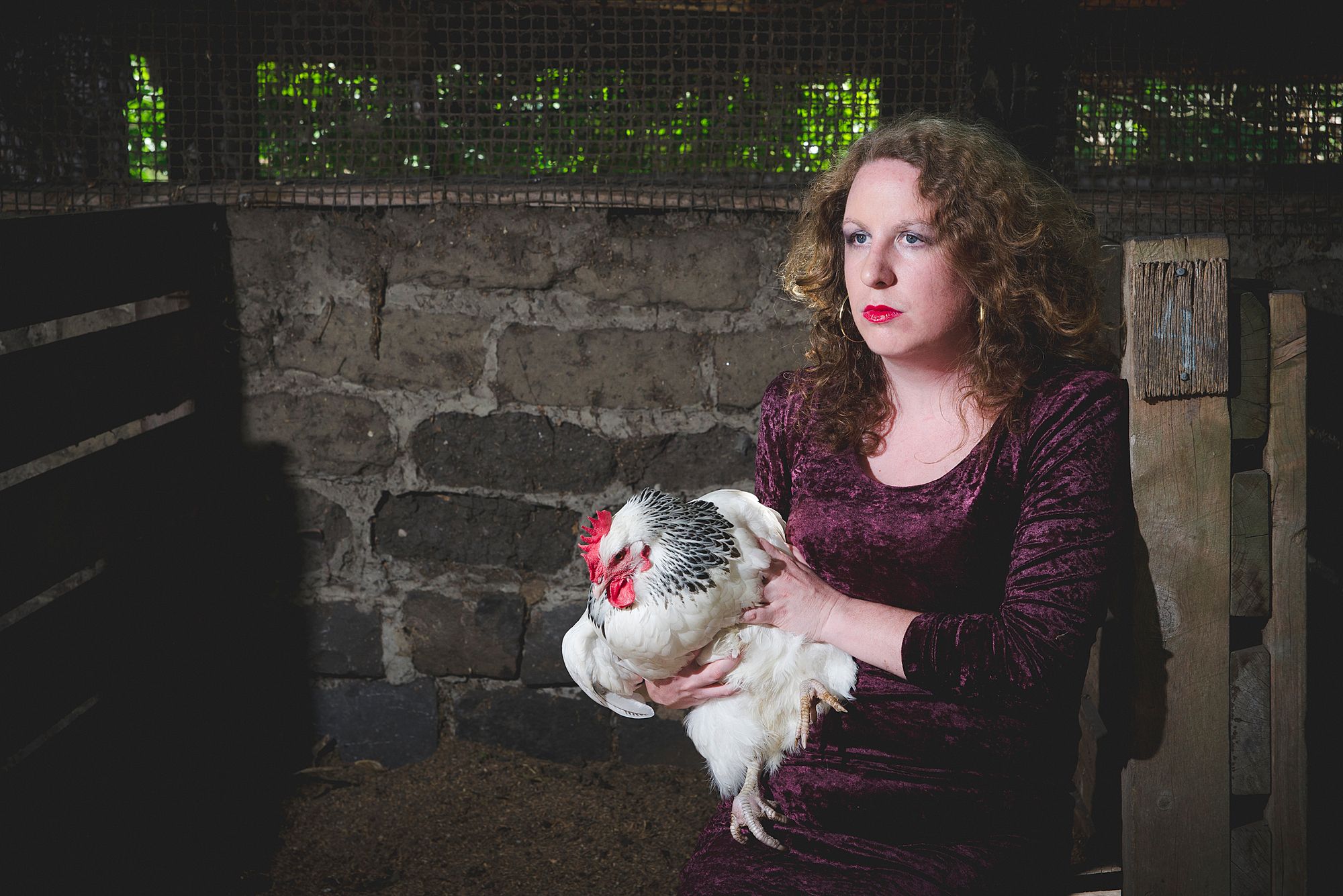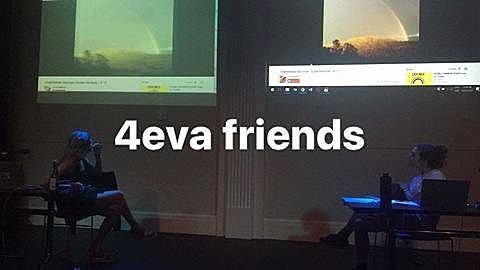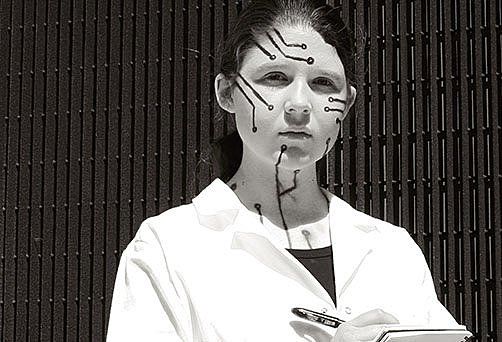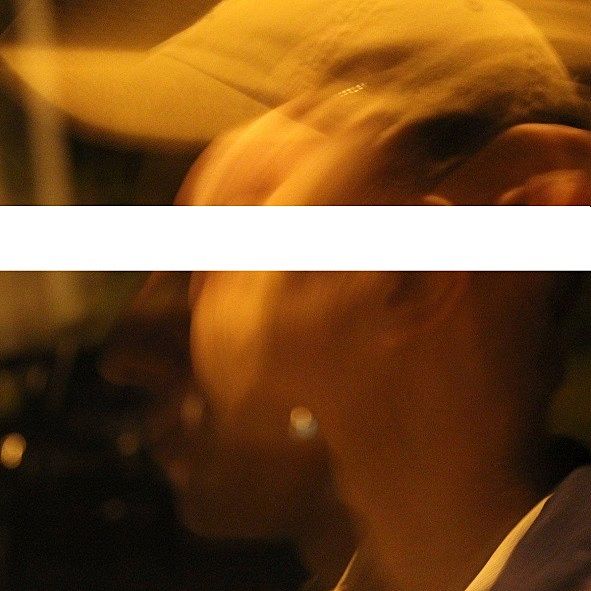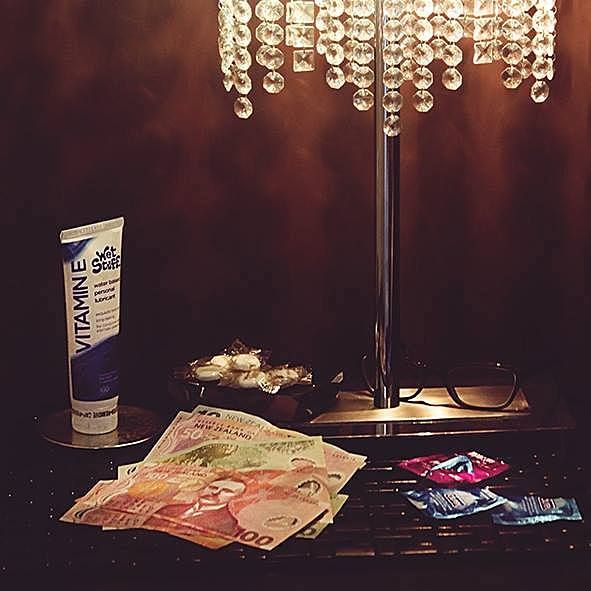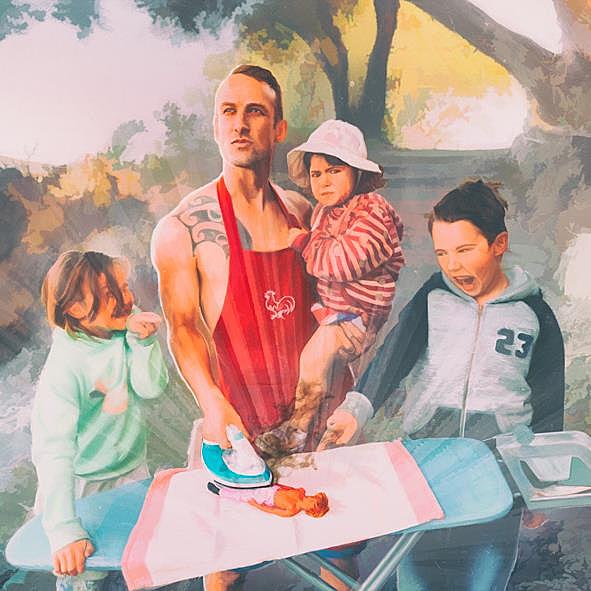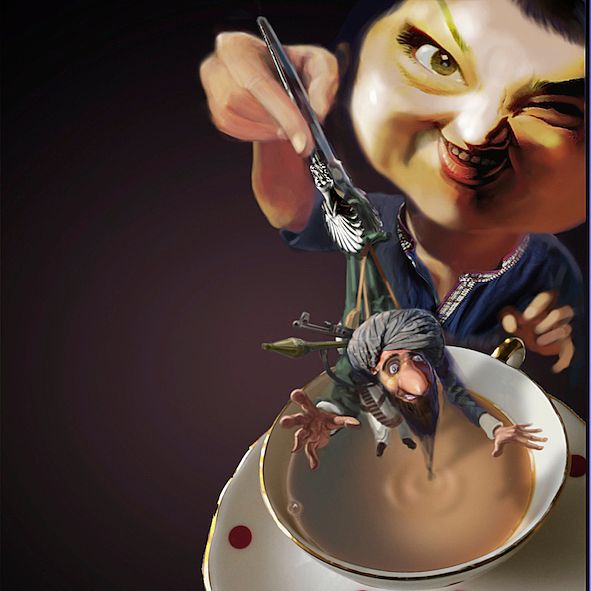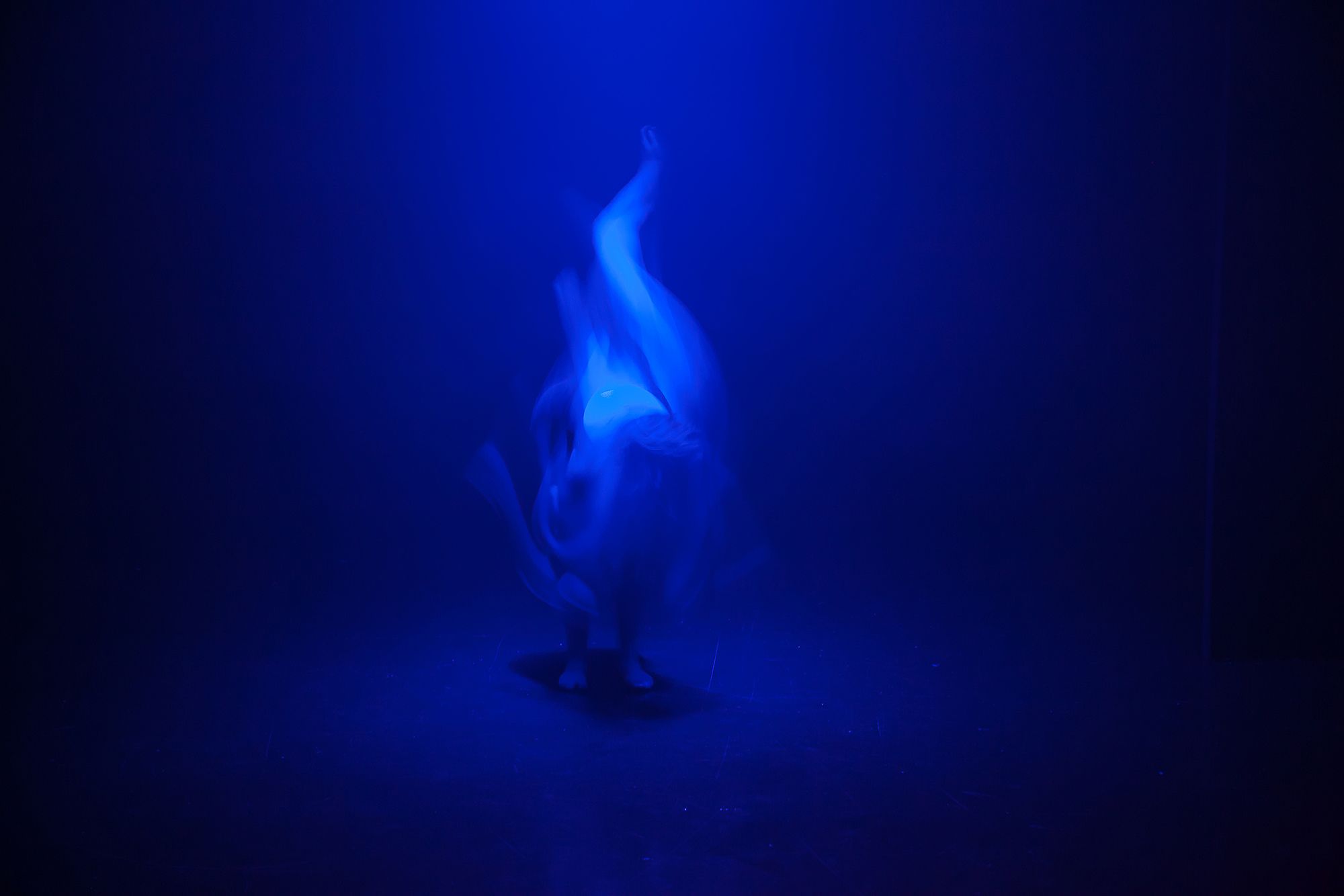Building A Destination Fringe: A Very Holistic Look At The New Zealand Fringe Festival 2017
Our review team for Wellington's New Zealand Fringe Festival - Adam Goodall, Shannon Friday, Matt Loveranes, Mia Gaudin and Fiona McNamara - talk about the festival just been: its highs, its lows and its must-do-betters.
On Monday the 6th of March, our review team for Wellington's New Zealand Fringe Festival - Adam Goodall, Shannon Friday, Matt Loveranes, Mia Gaudin and Fiona McNamara - got together to eat ramen and talk about the festival just been: its highs, its lows and its must-do-betters. This is the transcript of that conversation. If you want to jump to specific parts of the conversation, click on one of the chapter titles below -
James Nokise
Australians
Young Theatre and Works in Development
Honesty and Trust
Fringe and Artists of Colour
Shannon Friday's Favourite Show?
Mia Gaudin's Favourite Show?
Matt Loveranes' Favourite Show?
Fiona McNamara's Favourite Show?
Adam Goodall's Favourite Show?
Adam Goodall (AG) I want to start by talking about some of the broader themes and trends we noticed during the Fringe, then talk about our favourite shows at the end. First, though, I wanted to raise the trend of one artist absolutely dominating this Fringe.
JAMES NOKISE
AG We originally planned to review Faovale Imperium, but we didn’t end up doing that because he told everyone right at the start of the show that it was a work in development. In it, James Nokise sets out to create a poetry show about James Cook as he sails around the Pacific Islands from the perspective of James Cook as written by James Nokise, interspersed with poems from Pacific Island and Maori women – Courtney Sina Meredith, Maraea Rakuraku – essentially creating a dialogue between his own character-based poetry and the poets that he’s asked to contribute to the project.
Mia Gaudin (MG) It was one of the best things I saw in the Fringe.
AG Why was that?
MG It’s really engrossing to watch somebody who’s so in charge of their material. He knows how to work with the crowd and he’s really comfortable.
I think he was also exploring his range in that it’s not just comedic – he had some poems that were getting laughs, like Cook’s Wank, but he was also engaged. I guess it’s similar to his comedy that I’ve seen, exploring themes of the Pacific diaspora and New Zealand and how the Pacific is imagined by other people around the world, but he even said that this is not meant to be a comedy show. Mainly, though, I think it’s because he has such a charming, confident way of presenting himself and that’s a part of performance that really appeals to me.
Shannon Friday (SF) Which is something, because we don’t have a lot of Cook’s letters, but the few that we do, Cook himself comes across that way. There are all these little jokes written into them: in one, he describes going to one of the Pacific Islands – and I’m not going to insult people by misremembering which one – and he talks about how all of the men were naked above the waist, and he was writing that to a funder’s wife, which is an extremely provocative and funny thing to write to a backer’s wife.
MG Yeah, James really played on that, didn’t he? A couple of them were letters writing back to the wife and he was describing going back to Tahiti and describing the women there.
AG What I really love about it is that it feels in many ways like an extension of what Nokise was doing with Rukahu.
Matt Loveranes (ML) Yeah, totally.
Nokise's not a performer I would ever second-guess. Faovale confirmed to me that he’s one of the best performers that we have in this city, if not this country.
AG It feels like taking versions of exoticism and colonial dehumanisation directed at the Pacific Islands and deconstructing them, pulling them apart, confronting the audience with them. And he’s so comprehensive about it.
ML I also enjoyed the show because it wasn’t just his voice, it was the voice of these other women as well.
AG They all communicate these ideas with such clarity, with cutting humour and a sense of gravity. He’s not a performer I would ever second-guess. Faovale confirmed to me that he’s one of the best performers that we have in this city, if not this country.
Fiona McNamara (FM) Yeah, I totally agree. He’s definitely my favourite comedian. His work is so intelligent and it’s really political and really analytical of society in a way that a lot of comedy isn’t. A lot of comedy claims it’s political because it mentions something that an MP’s said with no analysis, whereas James actually gives a really clear analysis of what he’s talking about.
ML And the result is always very theatrical, very engaging and fresh. Most of the things he does are done with such passion; when he experiments with a form, it’s always very cool.
AG Which is interesting, given his involvement as well in Fiery Tongues. It’s essentially a historical look through radical and revolutionary poetry–
AG No! It’s led by Roy Hutchins from Brighton; Dr. Mike Blue plays basically through the show, the show’s set to his beat; and Anya Tate-Manning, James Nokise and Sameena Zehra perform.
A friend, who’s a slam poet, and her partner went to Fiery Tongues the night before I went and they weren’t into it; they wished it had had more of that revolutionary poetry in it, just being read. My flatmate’s partner said, “We didn’t need to be convinced that poetry is good and that poetry can change the world.”
MG But don’t you? I mean, maybe they don’t–
If I made a performance that made people be like, “performance and theatre can change the world!”, I’d be stoked! Right?
AG Yeah, and this is the thing. When I saw it the day after, I loved it, it was one of my favourite Fringe shows, and part of the reason is because I don’t have that background in poetry.
FM As a performance maker, if I made a performance that made people be like, “performance and theatre can change the world!”, I’d be stoked! Right?
AG Right! I mean, I didn’t necessarily come away from it thinking poetry could change the world, but I came away revitalised and more interested in poetry and in particular poetry used to radical ends.
I went on the night Gareth Morgan went,though, and it did not suck him in – he was two rows in front of me and clutching his hands and covering his face. It was hilarious and awkward in equal measure.
MG Didn’t Jo Randerson join them for one of them?
AG Yeah, they had guest poets come in. Jon Bennett did a poem from his show, which felt very out of place. You have fifty minutes of ‘poetry can change the world, here’s all this radical poetry’ and then Jon Bennett comes in and says, “My poem is called ‘The First Time I Had Sex I Tried To Put My Balls In’.
SF Slight mismatch.
AG Yeah. And, I mean, his show [My Dad’s Deaths (A Comedy)] was wonderful too. I had a great time. I called my parents two days after. But...
MG I have my Tinder date with him on Tuesday.
Everyone screams.
AUSTRALIANS
AG The Australians were really good this year.
FM Yeah, and there were more international shows in Fringe. There seem to be more and more every year, particularly Australian. It seems like New Zealand Fringe has built quite a lot of relationships with Australian Fringes, which is awesome.
MG I went to Jon’s storytelling workshop on Saturday the 4th and he was saying he doesn’t go to some of the bigger Fringe Festivals anymore because it’s so competitive and you never make any money. So maybe, like him, more people are attracted to a smaller festival.
ML I think because a lot of their shows are really strong as well, because most of those shows really pushed their form, it shows a lot of New Zealand artists how much potential there is to push their work even further, to more interesting explorations of form. The two shows coming from Australia that really did that was Onstage Dating and the internet is where innocence goes to die and you can come too.
MG And did you see We May Have To Choose?
ML Yeah, We May Have To Choose as well.
MG the internet and We May Have To Choose, to me they were almost as if they had come out of a performance art practice as opposed to a theatre practice. They were the kind of thing you might see art school graduates doing, which I thought was interesting. Both of those shows were more interested in breaking down traditional performance format.
ML And it was incredibly exciting to watch and see even if they didn’t, you know, succeed all the time. They were fresh and they were refreshing to me, and I don’t see that creativity reflected enough in the New Zealand works in the Festival.
It reminded me of hanging out in your dorm room with your giant bloody laptop PC and you’re on this wall doing your MSN Messenger to your roommate, who is sitting, like, chairs back to each other, and how novel that was as an experience to feel, like, ‘oh, we’re in the same space but it’s mediated!’
FM I wasn’t as big a fan of the internet as everyone else, but I think we should start by saying why you like it rather than, yeah.
AG It’s a show where the two performers [Harriet Gillies and Roslyn Helper] sit on stage at their Macbooks, their screens projected behind them, and they open up a Facebook chat, invite the audience into it and start surfing the internet. The intention being that we guide, or at least interact with, the performance through the chat.
SF It reminded me a lot of, because I’m a fair bit older than the rest of you guys, when I was going to uni the internet was still new. Most people maybe had a computer in their home, maybe, so when you went to uni for the first time, that was the first time a lot of people started spending time on the internet and it reminded me of hanging out in your dorm room with your giant bloody laptop PC and you’re on this wall doing your MSN Messenger to your roommate, who is sitting, like, chairs back to each other, and how novel that was as an experience to feel, like, ‘oh, we’re in the same space but it’s mediated!’ And it’s amazing to me, because I graduated less than ten years ago, how quickly that’s flipped, and that this idea that we can be in the same space and it’s not mediated even though we’re online – that becomes a statement of very rapid change.
MG What do you mean, it’s not mediated?
SF I am throwing out a lot of grand statements. Like, the idea that so often when we run around right now, we’re on our smartphones and it’s a way of avoiding the people around us, but they’re like “No, we’re going to be on the internet together, in the same space,” and how radical that experience feels now.
AG Fiona, you mentioned you didn’t like the internet is where innocence goes to die as much as everyone else and I’m really curious about that?
FM I mean, I liked the overall idea – that it was taking place on the internet in front of us and we were all in that room while interacting in this virtual space, and I like the idea of chatting with the audience. I think that set-up’s awesome, I just wanted to use that set-up to bring in much more interesting content.
ML I agree.
FM It was like, “I’m going to do a show about the internet and the dark places in that”, and it’s immediately just porn. If you do a show called the internet is where innocence goes to die, there is a shitload of stuff on the internet that is a lot darker than that – that, like, tame porn. If you can somehow find a way to go into those darker places, I think it would be much more interesting, because there’s so much out there that’s way more sinister. I didn’t really feel like my innocence died in this performance at all.
The other thing I would say about that show is that if it is just going to be people chatting, it would be interesting to do that as a durational piece, longer than an hour, and kind of see where that goes. There’s just this format that’s set up, that’s going to end with some pizza coming in (which isn’t an original idea - I’ve seen so many shows with pizzas being ordered), it didn’t really go anywhere much and it didn’t really feel like the audience – you know, one of you was saying the audience would offer things and they didn’t really follow through. It didn’t feel like the audience was able to genuinely contribute to or shape the show at all.
MG And it was moving so fast, I think, on that chat that some things did get picked up but that other things did totally get lost.
AG On the final night, when I went the second time, the dynamic became a lot clearer to me. In particular, if you’re loud enough and frequent enough you can, in many respects, command the show. I was having a ball getting more stuck in than I had on opening night.
MG Did it feel like it got to a different concluding point the second time you went?
AG Yeah definitely.
MG No pizza-porn?
AG Oh, wait, no. This was the thing with a couple of the Australian shows I saw. Onstage Dating was the same. Seeing it the second time around was still exciting and fun, but a lot more of it was, I guess, planned than I thought.
MG Kind of like playing Cards Against Humanity the second time around?
AG Onstage Dating was – and I love that show to pieces, it has such a fascinating interplay with the audience and with that particular audience member that gets chosen, it raises some real interesting questions about safe audience interaction and what constitutes that and navigates those questions, I think, pretty well – but, particularly in the opening half, there was more of it that was planned than I thought there was. I’m not going to mention what it is, to ruin that for the reader [Onstage Dating returns to BATS Theatre on Tuesday 4 April], but it took a little bit of the magic away knowing that some stuff was a bit rather than an actual thing that was happening in the space.
MG Which I guess she has to do in order to make herself feel safe.
YOUNG THEATRE AND WORKS IN DEVELOPMENT
AG I wanted to talk about works in development and the way Fringe deals with them. The more experienced practitioners seem to know what they’re doing with works-in-progress. Troll, for example, was a surprisingly polished show for a work in a very early stage of development. But the show was presented in a hallway in their house, you sat on a stairway while Ralph performed it at the bottom of the stairs in a tiny, tiny space. It was koha, everything was right.
I worry that, outside of these experienced practitioners, it’s becoming harder to distinguish the works in progress from the finished products. The thing that entrenched that in my mind was the show Biased Beyond Belief and the conversations we were having around that.
MG Yeah. That was the second show that its writer had written, and it wasn’t at all advertised as being a work in development, but in the programme the Director’s Note very clearly asked for feedback: 'it’s been a development for our writing process and here’s our email address, please send us your thoughts after the show'. I definitely thought it was a work-in-progress and I said as much in my review.
AG And they charged sixteen dollars for it, right? And it was at BATS on a main stage. Development’s an amorphous thing within the Fringe Festival context, and you can’t be prescriptive about that because shows are in various stages of conception, but that seems to hide the development process and where that show is until you’ve paid for your ticket.
FM I think it’s interesting, Adam, where you’re saying there’s a kind of blurring of the line between what’s a work in development and what’s a finished show, but I think that it may seem like there’s this kind of blurred line because of shows like Faovale Imperium and Troll.
I saw neither of them, but I’m very familiar with the work of those artists from their previous shows and I would suspect that they were some of the best shows in the Fringe even though they were works in development, but they’re still not as good as those artists are going to make them. I think it’s great to see more of these works in development and I think that the Fringe Festival is a great place to do a work in development, but maybe there could be a section for works in development in the Fringe programme in the same way that you might have a section of play readings.
SF To me there’s something really interesting in the changing role of BATS in Wellington. There’s something about BATS itself as a venue – it used to be the place where all of these creaky, first-run shows would get all the kinks out and then they would tour nationally or internationally or whatever. Now BATS itself is kind of becoming the goal?
FM I think that’s a really good point, and I think that’s right – BATS now is where you expect to see professional-level work.
SF Entry-level professional, maybe.
FM Yeah, but also established professional. You get a mix, but you do expect professional work. You expect play readings and works in development when they’re billed as such.
Younger artists do need to be better equipped to move with and manage the changing expectations that come with a changing Fringe and changing spaces, and maybe that lies with the Fringe team.
AG And I think that’s part of the difficulty with young artists who maybe don’t know the distinction or who are making young work.
MG Their whole practice is in development, they’re always in development.
ML For the artists making the work, they’re not considering the wider audience coming into the Festival. They’re expecting people who are familiar with theatre who might expect something like that coming from young artists. But a more general audience who are like, “It’s the Fringe Festival, let’s go see something at BATS”, expecting something professional, I don’t think young artists consider them.
MG But it says it in its name, that it’s Fringe.
AG That’s another complication, though, because we have Fringe making more and more inroads with international networks, trying to position itself as this kind of Adelaide-esque ‘destination’ Fringe. I wonder what impact that has on younger artists who luck into a big space or who market a work in development without disclosing that or… there’s a complicated series of expectations there and I wonder what impact that has on the artists and I wonder what impact that has on the audiences.
MG So is your concern that artists will present themselves as having a finished work and then be reviewed as such?
AG It’s not so much about reviews. My concern is that when you’ve got a show that’s forty percent of the way there and you do it in a space like BATS, charging $16, the audience members you get – which includes established artists, artists you might like to reach out to and work with and get knowledge from – are seeing your show with the expectation that this is eighty percent, ninety percent there. That has an impact on how they perceive your work, on how they perceive you as an artist.
SF It felt like last year there was a lot more of the thing you’re identifying.
ML I was totally gonna say that.
SF My personal bugbear is that, as a maker, you may not actually be testing anything. A maker like Jane Yonge from The Basement Tapes, for example, was very clear about the questions that she still had dramaturgically before they planned to remount it. As someone who teaches theatre, too, a lot of those younger practitioners just don’t know how to build a good question yet. So at Fringe, they’re testing ‘can I make a show’, rather than ‘what am I testing for this audience.’
FM Because there’s a big difference between a work in development and a work that’s just not very good or just hasn’t been worked on enough. That’s why, when you go to James Nokise’s show or Trick of the Light’s show, it might have been the best thing you’ve seen because they’re still actually testing something.
AG And it’s great that that space exists! That a safety net like this exists.
SF There’s that great Ira Glass quote that the first ten years of your career, you just suck.
AG Yeah! And I honestly don’t know if there’s an answer to whether you can or should differentiate between works in development and finished products in the Fringe Festival and, if you do have that, what implications that has. What it looks like. I guess, because there were fewer examples of that this year, there was less blurring, it’s clearer that Fringe is moving towards that professional – not marketplace, but – ‘destination Fringe’. But younger artists do need to be better equipped to move with and manage the changing expectations that come with a changing Fringe and changing spaces, and maybe that lies with the Fringe team.
SF I do want to say that younger or less-experienced practitioners can still make some fucking amazing stuff and my example for that is Super Clean, which was sharp as a tack. That show knew exactly how it wanted to use every single theatrical language in its development, it was impeccably cast; I didn’t shout out to Emilie Hope in my review because it would have been a major spoiler, but she was on stage for three minutes in a thankless role and knocked it out of the damn park. And it’s a show that knows exactly what its music needs to be communicating to its audience, exactly what the performers need to be doing both with and against the audience, that knows exactly how it needs to position events in order to get the audience members to play along in a certain way.
HONESTY AND TRUST
AG I think we all noticed during the Festival that there were a number of shows where the performer’s trust in the audience – or lack thereof – was a live issue.
MG In Paying For It, five sex workers from Wellington told stories they had written themselves, and they were really amazingly written stories. We spoke to the editor afterwards and she said she hardly had to touch them.
FM And they started off the show with the two MCs being like, “Be gentle with us, we’re not performers! We’re not writers!” And it’s like… but you are. They totally didn’t need to make those apologies. They were all really good performers and the stories were all really well written and I think the thing that was so joyful about that show was that it was so honest and truthful . Because they were real people talking about their personal experiences.
In my day job – I work in sexual abuse prevention and so I do a lot of work with people working in sexual and reproductive health – when we come together from across the sector, people talk about the different aspects of their work. Everyone in that sector faces their work being sidelined, but the sex workers are so much more marginalised and stigmatised than everyone else. They just get so pushed to the sidelines and I think Paying For It was awesome because it brought those stories out and people heard them. I think it plays a really great role in breaking that stigma.
MG I liked it for also exposing audience members to art out of that community and to the vibrancy of that community. All of these people had relationships with each other and they knew each other; it felt like, “oh my god, there’s this whole network of people who are living these lives in this community we a) don’t know anything about and b) there’s not much positive engagement with at all.”
FM It’s also so complex. Sex work is so complex, people have all sorts of opinions about it. There was that beautiful story that guy told–
MG He was a sexual surrogate and his client was a young man with multiple sclerosis who had never had a sexual experience before, let alone intimacy at all, even from his own family. So the process of treating him was in a very gentle and considered, therapeutic way, and he told the story about how his relationship with that young man developed and it was just incredibly touching.
FM It was quite amazing, and that story was the real pinnacle of that kind of thing. You became so aware of how sex work is also social work, and it’s so much about working with individual people who for whatever reason have contacted a sex worker and they want all sorts of different things.
MG It was really a show about intimacy and what role intimacy has in our lives. Contrast it with DILF.
You became so aware of how sex work is also social work, and it’s so much about working with individual people who for whatever reason have contacted a sex worker and they want all sorts of different things.
FM For me the only reason that’s worth comparing it to DILF is just to be like…
MG He was, like…
AG The worst?
FM And it’s not, like, “oh gosh, I can’t think about these topics, oh gosh, I’m always going to be offended if you talk about sex,” or whatever, it’s like, no. You do whatever you want, just do it well.
MG He was a straight white male and he ‘recognised’ his privilege in the first ten minutes of it–
SF And seemed to think that was enough.
FM It really annoys me – and I’m censoring myself here – when people think that it’s enough just to be, like, “oh no, I’m aware that I’m speaking from the perspective of a straight white male.” That’s no better than just doing your show, saying that you’re aware that you’re being sexist or marginalising groups. That’s no excuse to continue to do it. It’s exactly like saying “No offence” and then saying your offensive thing.
SF The show lost me really early on at the bit with the child molester. He has this joke about a MILF plus a DILF equals a CILF, and you think it’s going to be a Child I’d Like To Fuck. So, as an audience member, you’re put into a situation where you’re sexualising children unintentionally–
FM And then he tells you off.
SF – and then he says, “that’s not what it actually is.” But then, he wants to make it so clear that he was not thinking that, that he goes into this very graphic and detailed, violent fantasy about castrating sex offenders that is really punishing to the audience at the expense of someone that’s not there. Even when Francesca Carney, his wife and his heckler, was chiming in, often she wasn’t taking him to task, often it was still aimed at a third party who wasn’t there.
I think it fundamentally doesn’t trust itself.
ML That’s the impression that I get. It’s like, “Look at these horrible stories that I’m brave enough to share with you–”
FM That’s totally how it billed itself.
ML But it’s not brave enough to actually get to the truth of those stories.
FRINGE AND ARTISTS OF COLOUR
ML I didn’t see a person of colour on stage until my sixth show.
AG It was a very white festival. You raised this last year as well.
ML I know, and it’s tough being the guy who always raises this but I always notice it. Like something like Stoge Chollonge, which I enjoyed immensely, but it would be so easy to substitute one of those people with a person of colour.
SF Pūtahi Festival is on at the same time and it has some amazing work, but if Fringe is a place where white people can fail then why isn’t Fringe a place where people of colour can fail? Why do indigenous artists go no, we’re not safe there, we need our own festival? That’s not to say Pūtahi should not exist; this is to say that Fringe and all of us who are white and working in Wellington theatre aren’t doing something right.
If Fringe is a place where white people can fail then why isn’t Fringe a place where people of colour can fail?
AG When I interviewed Cherie [Jacobson, former Programme Manager at BATS Theatre] last year, she mentioned that she was trying to build stronger relationships with Māori companies because that hadn’t happened for a while, but that those companies were very focused on having their spaces rather than using spaces that they didn’t perceive to be theirs or that they perceived to be Pākehā spaces. That seems to be what’s happened here: they don’t perceive Fringe as their space and Pūtahi is the festival that they’ve built to be their space.
MG I’ve been thinking about this quite a lot in the context of visual art. I’ve been talking to young indigenous curators who are grappling with those issues as well as to how to deal with an institution and should they be working within the institution or should they create their own space and not be restrained by any canonical institution.
AG I don’t mean that Fringe can’t change or that it’s fine, mind.
MG No, but it’s a huge question across the arts, not to mention other sectors of society. I think it is something to address in terms of giving power to Māori and Pasifika artists or people of other diversities. This young curator that I’ve been talking to, she’s got this idea that all these white curators that hold all these posts in big art galleries need to step back now and that’s really threatening to people who are listening to her and they’re in those positions. How do you mediate that?
SHANNON FRIDAY’S FAVOURITE SHOW?
SF My theatre kryptonite, the thing that just brings me to my knees immediately, is a show that just knows exactly what it wants to do with every moment on stage. My three favourites all did that, knew exactly what they wanted for and from their audience. They were Onstage Dating, Super Clean and The Basement Tapes.
AG So we’ve talked about two of them already but we haven’t talked about Basement Tapes.
SF The Basement Tapes is a psychological horror set in a grandmother’s basement shortly after she’s passed away; her granddaughter is down there clearing out her stuff and picking out what she wants to keep as heirlooms. In the process, she comes across some old cassette tapes and finds some very creepy and disturbing recordings on them that change the way she views this woman she knew her whole life.
This show rewarded my attention on every single level. The recordings were weird and poetic, and the beginning opens this big question of how much of is real versus how much of this is practiced. And Stella’s [Reid, the performer in The Basement Tapes] physical performance is amazing.
ML Stella did a choreographed dance to Fade by Kanye West and it was amazing –
SF Like upside-down twerking on the wall, like that girl’s got moves. And even before that, the bit that takes place in the darkness as you’re getting used to having to listen, and the way that that conversation plays out: none of the audience rules have been set up yet, and suddenly the granddaughter is going, ‘Is anyone there? Can you hear me? Can you help me?’ As an audience member, there’s a great thing where you wonder whether this is a show where you’re allowed to say something; you’re put into this place of vivid uncertainty that perfectly prepares you for everything that comes after, constantly asking, can I trust everything that is here? It’s that constant second guessing of whatever impulse you’re having. It was just so clever and well done and good and I liked it a lot.
ML It was a really satisfying show for me. The most satisfying horror show I’ve seen.
AG It knows the conventions so well and it plays them. The sound design is so important in terms of just the way it plays with your perception of the space and the way that it plays with your perception of the action on stage.
MIA GAUDIN’S FAVOURITE SHOW?
MG I think my favourite was Faovale Imperium, but one show that we haven’t talked about at all that I really enjoyed was Two Girls One Shop. I think that’s a good one to talk about in terms of the young theatre: Two Girls One Shop was two young performers, probably not even in their twenties yet, I would say, who had come out of the Court Theatre youth programme in Christchurch. Their set-up was these two girls working in this shop.
SF And they’re shallow, awful people.
MG Yeah! I thought the script was really well done. It was really sharp and just kept hitting us with great one liners. It definitely veered into obscene jokes that lost some of the audience a bit, but I had a really fun time and I got a little obsessed with them. Like, who are these young women who just made this really popping show and it’s their first time coming to Wellington and they don’t know anybody!
SF The characters in that are so strong and the situation was so strong. I almost wondered why it wasn’t a web series. These young ladies would just blow up YouTube in a heartbeat with a six minute web series set in Glassons.
AG I’m one of those audience members that it didn’t play well with. The story holding it together was threadbare at best and the lack of momentum lost me.
MG You’re right, the narrative push was weak but I thought the characterisation and all of the lines that came out of that were really strong. They’re so self reflective but also they’re such shallow characters that it’s kind of hilarious that they’ve written it.
MATT LOVERANES’ FAVOURITE SHOW?
ML My favourite show of the Fringe is actually Faovale Imperium, but one that really comes close and I really want to talk about is Sameena Zehra’s Tea With Terrorists, which I thought was a testament to how beautiful her storytelling is. She had no frills, no set design, she had nothing but the eloquence of her words and the vivid mental images that she would paint with them. Her jokes were hilarious, and she completely paints a picture of this world that we’re so unaware of, humanising terrorists in such a weird, weirdly lovable way, as just helpless young men who are sucked into this lifestyle.
I was in love with her from hearing the sound of her voice: how she would luxuriate on certain words and just pull you in that much deeper into the story. I really, really loved it. She’s great.
AG She’s just a wonderful presence and the stories that she builds, they’re so small…
ML And so personal! Her Grandma. You could imagine her Grandma just telling those terrorists off, and you go Grandma! That was a highlight of the Fringe for me, definitely. I think she has loved being in Wellington and I’m hopeful to see more of her in the future.
FIONA McNAMARA’S FAVOURITE SHOW?
FM I think my favourite show was Paying For It. It was a great show and we’ve covered that one, so the one I’ll talk about is Maggot, which was a great time. It was set up to be these British popstars who were people who I would normally find quite annoying. When they first came and greeted us at the box office and were like hey, what are you doing here and I was like fuck off, it was so annoying, and then I was chatting with my friends and they were joining in! I was like stop it!
But they completely turned that around and it was super surprising. They were using their clowning skills and they were all great trained clowns. They started off with these really cool, aloof characters and then suddenly they were these weird hopping leprechauns with elf ears on and they were playing flutes but not properly playing flutes, they were actually just humming and make squeaking noises.
SF There was one scene that was just a bunny trying to reach a carrot. That was all the scene was for three minutes, and it was side splittingly funny.
FM It was super weird. It was like why I really love Green Wing as a TV show: it sets itself up as a hospital comedy with standard jokes, but then the characters are super weird and there’s a person riding a camel through the hospital and all of that surreal stuff which I totally didn’t expect at the beginning.
It’s one that I would definitely love to see developed. I think it wasn’t fully finished but it was clearly some really talented performers who had done some great stuff. I really wanted the whole environment to be part of all those sketches: I wanted a mirror ball and flashing lights to make the whole thing really intense. So yeah, Maggot. See it when it comes back.
ADAM GOODALL’S FAVOURITE SHOW?
AG I think we’ve covered most of my favourite shows, we covered Onstage Dating and the internet and Basement Tapes. The one I want to mention – I’m just a massive sucker for horror even though I’m terrible at dealing with it, and I think that Dark Matter plays with that language incredibly well. It’s a mystery that I haven’t solved, I’m nowhere near close to solving, which is exciting to me. It’s great to come out of a show and still have it really vivid in your mind two weeks after, but not really know why.
It’s a really fascinating series of images and it feels like a fucking portal to a weird nothing apocalypse. It’s beautiful and it’s very austere and it holds you at arm’s length. I really struggle with words for it. It blew my mind time after time after time, I was just so lost in each individual series of images, it’s an incredible sensory experience and I think what Martyn and his team have done is really phenomenal.
It also trains your eye really well. It reminded me of It Follows, which is a horror movie about a monster that’s essentially passed from teen to teen when they have sex. It sounds like a super campy idea, but it’s this very still movie with a lot of wide shots where you’re just learning to train your eye to see where the monster is because the monster’s just a person, you don’t know what this person looks like, you don’t know who this person is, just a person walking at an even pace towards the haunted person. And David Robert Mitchell, the director, uses those frames really well to train your eye to pick up the smallest details and pick up the smallest aberration in a normal image. Dark Matter feels like that in that it really trains your eye to pick up the smallest movement, the smallest glimpse of something in these really bleak, blue landscapes. I really loved that show.
Correction: This article previously referred to Biased Beyond Belief as the first show that its writer, Evangelina Telfar, had written. Telfar previously wrote the play Surgery In Mind, which premiered in the 2015 New Zealand Fringe Festival.
